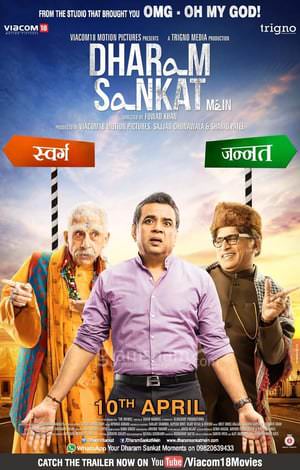Dharam Sankat Mein Reviews and Ratings

-
Yes, the film does burst quite a few religious myths that prevail in our society, but that alone does not make it an engaging one. We would not say that the film is avoidable as there is a message on blind faith that needs to be hammered in our heads, but as far as we see it as a commercial film, we would say that there was a little more effort required on the part of the director.
-
The actors are in top form – Paresh Rawal is a seasoned actor and Annu Kapoor gives him good company. Nasseruddin Shah does justice to his flamboyant character. All said and seen, Dharam Sankat Mein deals with an important subject and nevermind if it is not entirely satisfying, it is still is a positive step towards better cinema.
-
Clichéd representations of common stereotypes make the interest diminish. The performances by the three main leads and the all-too-brief bits of alleviating humor are the only magnets to your interest!
-
The satire works at its best when Rawal is at the forefront of things. Thankfully, that’s for almost all of the film. Without him, it would’ve been an also-ran.
-
Humorous in parts, the film tries too hard to strike home the point.
-
Dharam Sankat Mein has many, many flaws, not the least of which are incredible plot twists (particularly at the end) and the ghastly performances delivered by the actors playing Dharam’s wife and son. While it keeps the audience hooked until interval, the second half of the film meanders into listlessness and struggles to keep up the energetic pace it had initially.
-
Dharam Sankat Mein had quite an uphill task of balancing comedy and the religious sentiments of its audience. It succeeds fairly well – the jokes are in good taste and the film presents the hypocrisy in blind belief, rather than faith per se. Both Hindu and Muslim customs, two polar opposite sides of the spectrum, are made fun of with equally measured, over-careful restraint. Gujarat’s ban on alcohol gets a subtle dig.
-
…is a very dull fare and its business prospects will be no better.
-
…is more of an attempt at making some quick cash than to make a film with a heart and mind of its own. With very few moments of fun sandwiched between long stretches of snoozing, this film should be avoided like the ashram of a self-proclaimed baba.
-
I appreciate the fact that despite the preachy nature of the film, a different approach was endeavoured. More power to such trials even if not many of us are taken in by them.
-
Popular entertainment, or a lively, mass-oriented film such as this, is perhaps our most potent counter to a frightening intolerance. That fact alone makes this a very important and brave film. I suggest you head to the ticket counter for sure.
-
Ultimately, between its sentimental leanings and farcical outbursts, the superficial sermonising of Dharam Sankat Mein remains just that — superficial.
-
Even Naseeruddin, Annu can’t save this repetitive, preachy monologue on moral qualms…
-
The story tries to accommodate a whole host of issues, fake babas to real crimes, and fails. The Neelananda track is overplayed while the music is underdone. Given its realistic detailing, this could have been a livewire of wry wit – but it ends up a feather-duster of fuzzy philosophy instead. Caught between wise-cracking veterans and wise-sounding vachans, large sequences look low on energy and stereotypes, from lusty swami to kajal-eyed imam, stretch to yawning point.
-
Dharam Sankat Mein, an official remake of the 2010 British comedy The Infidel, is certainly not half as horrid as the aforementioned monstrosity. But it is not in the OMG league either although that is quite clearly where it aspires to be.
On one count at least, this film should pose no sankat to anybody. It is easy to rate Dharam Sankat Mein: one star for intention, but only half for execution.
-
The central question this film raises is profound: does the religion you are born into define you for the rest of your life? What if you are not who you believed yourself to be? It articulates the anxieties we live with, and uses the words ‘Hindu’, ‘Muslim’, ‘Isaai’ loudly and clearly, which is a relief because films these days are steering clear of these basic descriptives because we are now a nation of the easily offended. But it doesn’t jump into the deep end, carefully skirting the tough questions, and sticks to the majoritarian path, and clichéd representations.
-
Director Fuwad Khan should get the credit for choosing a sensitive subject with the right kind of intention, but unfortunately, the end result is far from what it could have been.
-
Earnest, but clichéd…a bold attempt and some very good performances by the lead cast may make it worth your while.
-
Bad Version Of Oh My God…This film achieves a remarkable threshold of thoughtful humour. Though a lot of it is gradually eroded by over-punctuated satire, this is that rare film which takes potshots at the religious divide without offending anyone.
-
Today, when fundamentalism is one the rise, we need more films like Dharam Sankat Mein to remind us that harmony and tolerance are the need of the hour. That we are the same beneath the façade and that the stone I throw at my neighbour might boomerang towards my own house…
-
…has some lucid moments of self-questioning where the religious divide is pungently scrutinized and satirized. Hilarity at the cost of organized religion is not an easy target to achieve for any filmmaker. This films achieves a remarkable threshold of thoughtful humour.Though a lot of it is gradually eroded by over-punctuated satire, this is that rare film which takes potshots at the religious divide without offending anyone.
-
…is a YAWN FEST. Despite having such a heavy star cast, the film fails to impress. Being a satire it falls flat at making you laugh because of its bad script and shoddy direction.
-
…is once again an all talk, no play movie. It is funny in parts but overall the preachy type film that addresses the same issues of religion and Godmen.
-
…should be watched for its sheer simplicity and also for the message that has been conveyed through the film.































